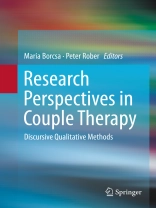In this powerful volume, six qualitative methods are used to analyze a couple therapy with a troubled young couple, illustrating the intricate processes and sub-processes of therapy through client interactions with their therapists and with each other. Increasingly popular for revealing the nuances and complexity of human interactions, qualitative approaches focus on process and discursive methods which can be particularly rewarding in multi-client settings. Through the examples that make up the text, practitioners and researchers become better acquainted with the power of qualitative perspectives and are encouraged to examine their own views on therapy as they consider these and other concepts:
The development of dialogical space in a couple therapy session.
Introducing novelties into therapeutic dialogue: the importance of minor shifts of the therapist.
Therapists’ responses for enhancing change through dialogue: dialogical investigationsof change.
Fostering dialogue: exploring the therapists’ discursive contributions
in a couple therapy.
Dominant story, power, and positioning.
Constructing the moral order of a relationship in couples therapy.
Research Perspectives in Couple Therapy: Discursive Qualitative Methods ably demonstrates the balance between therapeutic art and science for family and couples therapists, psychologists, and other mental health professionals in research and practice.
表中的内容
The Challenge: Tailoring Qualitative Process Research Methods for the Study of Marital and Family Therapeutic Sessions.- The Couple Therapy of Victoria and Alfonso.- The Development of Dialogical Space in a Couple Therapy Session.- Introducing Novelties into Therapeutic Dialogue: The Importance of Minor Shifts of the Therapist.- Fostering Dialogue: Exploring the Therapists’ Discursive Contributions in Couple Therapy.- Dominant Story, Power and Positioning.- Latent Meaning Structures in Couple Relations: Introducing Objective Hermeneutics into Systemic Therapy Research.- Family Semantic Polarities and Positionings: A Semantic Analysis.- Constructing the Moral Order of a Relationship in Couples Therapy.- About Complexity, Difference, and Process: Towards Integration and Temporary Closure.
关于作者
Maria Borcsa, Dipl.-Psych., Ph D, is a Professor of Clinical Psychology at the University of Applied Sciences in Nordhausen, Germany. She is also a Licensed Psychological Psychotherapist and family therapist, trainer and supervisor. She has been board member of the Systemic Society (Systemische Gesellschaft), German Association for Systemic Research, Therapy, Supervision and Counselling; member and board member of the European Family Therapy Association (EFTA) (2007-2016), Chair of the Chamber of National Family Therapy Organizations of EFTA (2010-2013), and President of EFTA (2013-2016). Dr. Borcsa is also a founding member of the Institute for Social Medicine, Health Care Research and Rehabilitation Sciences at University of Nordhausen; Co-editor of the scientific journals “Systeme” (2001 -2014) and “Psychotherapie im Dialog” (2007-2018), member of the Editorial Board of the journals ‘Testing, Psychometrics, Methodology in Applied Psychology’, “Contemporary Family Therapy”, Associate Editor of the “Encyclopedia of Couple and Family Therapy” and Advisory Editor of “Family Process”.
Peter Rober Ph.D., Professor in Clinical Psychology at Leuven University (KU Leuven), Belgium. He is a family therapist, supervisor and family therapy trainer. His research focus is on family therapy and family communication (e.g. family secrecy, selective disclosure, dialogical space, …). He has written four books in Dutch and has published several articles in international journals on family therapy and qualitative research.












